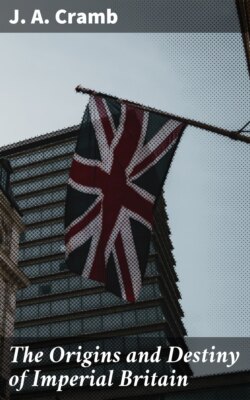Читать книгу The Origins and Destiny of Imperial Britain - J. A. Cramb - Страница 24
На сайте Литреса книга снята с продажи.
§ I. OF THE ACTION OF STATES AND OF INDIVIDUALS
ОглавлениеThere is a kind of criticism directed against politics which, year by year or month by month, makes the discovery that between the code which regulates the action of States and the code which regulates the actions of individuals divergencies or contradictions are constantly arising. War violates the ordinances of religion; diplomacy, the ordinances of truth; expediency, those of justice. And the conclusion is drawn that whatever be the softening influences of civilization upon the relations of private life, within the sphere of politics, barbarism, brutally aggressive or craftily obsequious, reigns undisturbed. Era succeeds era, faiths rise and set, statesmen and thinkers, prophets and martyrs, act, speak, suffer, die, and are seen no more; but, scornful of all their strivings, the great Anarch still stands sullen and unaltered by the centuries. And these critics, undeterred by Burke's hesitation to "draw up an indictment against a whole nation," make bold to arraign Humanity itself, charging alike the present and the past with perpetual self-contradiction, an hypocrisy that never dies.
Underlying this impeachment of Nations and States in their relations to each other the assumption at once reveals itself, that every State, whether civic, national, or imperial, is but an aggregate of the individuals that compose it, and should accordingly be regulated in its actions by the same laws, the same principles of conduct, as control the actions of individuals. And he therefore is the greatest statesman who constrains the State as nearly as possible into the line prescribed to the individual—whatever ruin and disaster attend the rash adventure! The perplexity is old as the embassy of Carneades, young as the self-communings of Mazzini.
Yet certain terms, current enough amongst those who deliver or at least acquiesce in this indictment (such as "Organism" or "Organic Unity" as applied to the State), might of themselves suggest a reconsideration of the axiom that the State is but an aggregate of individuals. The unity of an organism, though arising from the constituent parts, is yet distinct from the unity of those parts. Even in chemistry the laws which regulate the molecule are not the laws which regulate the constituent atoms. And in that highest and most complex of all unities, the State, we find, as we might expect to find, laws of another range, and a remoter purport, obscurer to us in their origins, more mysterious in their tendencies, than the laws which meet us in the unities which compose it. In the region in which States act and interact, whether with Plato we regard it as more divine, or as Rousseau passionately insists, as lower, the laws which are valid must at least be other than the laws valid amongst individuals. The orbit described by the life of the State is of a wider, a mightier sweep than the orbit of the separate life. The life which the individual surrenders to the State is not one with the life which he receives in return; yet even of this interchange no analysis has yet laid bare the conditions.
These considerations are not designed to imply that in the relations between States the code of individual ethics is necessarily annulled; but to suggest that the laws which regulate the actions or the suffering of States, as such, have too peremptorily been assumed to be, by nature and the ground-plan of the universe, identical with the laws of individual life, its actions or its sufferings, and that it is something of a petitio principii, in the present stage of our knowledge, to judge the one by the standards applicable only to the other.
The profoundest students of the actions of States have in all times been aware, not of the fixed antagonism, but of the essential distinction, between the two codes. Every principle of Machiavelli is implicit in Thucydides, and Sulla, whom Montesquieu selects as the supreme type of Roman grandeur, does but follow principles which reappear in the politics of an Innocent III or a Richelieu, a Cromwell or an Oxenstiern.[1] The loss of Sulla's Commentaries[2] is irreparable as the loss of the fifth book of the Annals of Tacitus or the burnt Memoirs of Shaftesbury; in the literature of politics it is a disaster without a parallel. What Sulla felt as a first, most living impulse appears in later times as a colder, a critical judgment. It is thus that it presents itself to Machiavelli, not the writer of that jeu d'esprit, Il Principe, perplexing as Hamlet, and as variously interpreted, but the author of the stately periods of the Istorie and the Discorsi, the haughtiest of speculators, and in politics the profoundest of modern thinkers. M. Sorel encounters little difficulty in proving that the diplomacy of Europe in the seventeenth and eighteenth centuries is but an exposition of the principles of the Discorsi; Frederick the Great, who started his literary activity by the refutation of the Prince, began and ended his political career as if his one aim were to illustrate the maxims that in the rashness of inexperience he had condemned; and within living memory, the vindicator of Oliver Cromwell found in the composition of the same Frederick's history the solace and the torment of his last and greatest years.
To press this inquiry further would be foreign to the present subject; enough has been said to indicate that from whatever deep unity they may spring, the laws which determine the life of a State, as displayed in History, are not identical with the laws of individual life. The region of Art, however, seems to offer a neutral territory, where it is possible to obtain some perception, or Ahnung as a German would say, of the operation in the life of States of a law which bears directly upon the problem before us.
